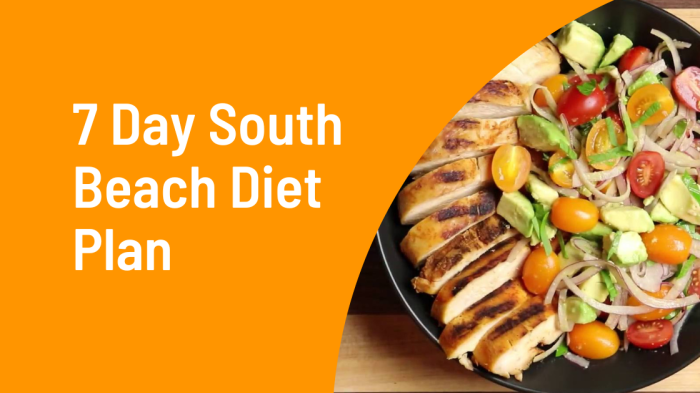South Beach Diet Prepared Foods offer a tempting shortcut for those seeking the benefits of the popular diet plan. But are these convenient meals truly a healthy and effective option? This in-depth look explores the nutritional content, brand availability, consumer experiences, and overall value proposition of pre-packaged South Beach Diet options, comparing them to other diet meal delivery services and highlighting potential benefits and drawbacks.
We’ll delve into the specifics of the South Beach Diet’s principles, examining the macro and micronutrient profiles of various prepared meals. We’ll also compare pricing, ingredient lists, and manufacturing processes across leading brands, giving you a clear picture of what to expect. Ultimately, we aim to equip you with the knowledge to make an informed decision about whether South Beach Diet prepared meals align with your health goals and lifestyle.
Comparison with Other Diet Meal Plans

Choosing a diet meal delivery service can feel overwhelming. The market is flooded with options, each promising rapid weight loss and effortless convenience. Understanding the nuances of different plans—their nutritional profiles, pricing structures, and overall ease of use—is crucial for making an informed decision that aligns with your individual needs and goals. This comparison focuses on the South Beach Diet prepared meals and how they stack up against other popular services.
Several factors differentiate diet meal delivery services. Nutritional approaches vary widely, from low-carb to high-protein, impacting both the types of foods included and the overall macronutrient breakdown. Cost per meal can fluctuate significantly, influenced by factors such as ingredient quality, portion sizes, and the frequency of deliveries. Convenience, too, is a key differentiator, considering aspects like meal preparation time, delivery options, and the overall user experience.
Nutritional Profiles of Different Diet Meal Plans, South Beach Diet Prepared Foods
The South Beach Diet emphasizes a balanced approach, limiting refined carbohydrates and prioritizing healthy fats and lean proteins. This contrasts with some services that heavily emphasize protein, potentially neglecting the importance of adequate fiber and micronutrients. Other plans might focus on restrictive calorie counts, potentially leading to nutrient deficiencies if not carefully managed. For instance, a strictly low-calorie plan might lack the essential vitamins and minerals found in a more balanced approach like the South Beach Diet.
A key difference is the South Beach Diet’s phased approach, allowing for gradual reintroduction of certain carbohydrates as progress is made.
Cost Comparison of Diet Meal Delivery Services
Pricing varies considerably across different services. Factors influencing cost include the number of meals per week, portion sizes, and the type of ingredients used. South Beach Diet prepared meals might be positioned at a mid-range price point compared to some budget-friendly options that may use less expensive ingredients or smaller portion sizes. Conversely, some premium services might offer organic, locally sourced ingredients, resulting in a higher price tag.
A thorough review of pricing per meal is necessary to compare value.
Convenience and User Experience
Convenience is a major selling point for all diet meal delivery services. South Beach Diet prepared meals offer the convenience of pre-portioned, ready-to-eat meals, eliminating the need for grocery shopping, meal planning, and cooking. However, some services might offer greater flexibility in meal customization or menu choices. Factors like delivery frequency, subscription options, and customer service responsiveness also contribute to the overall user experience.
Some services may offer more convenient delivery windows or easier-to-navigate websites and apps than others.
Comparison Table: Three Diet Meal Plans
| Feature | South Beach Diet | (Example Plan A: e.g., Nutrisystem) | (Example Plan B: e.g., Factor) |
|---|---|---|---|
| Nutritional Focus | Balanced, low-glycemic, emphasizes healthy fats and lean protein | High protein, low carbohydrate | Plant-based options available, emphasis on whole foods |
| Cost per Meal (Estimate) | $12-$15 | $10-$12 | $15-$20 |
| Convenience | Ready-to-eat meals, minimal preparation | Ready-to-eat meals, some require heating | Ready-to-eat meals, various options available |
| Customization | Limited meal choices within the plan | Some meal customization options available | High degree of meal customization |
Potential Health Benefits and Risks: South Beach Diet Prepared Foods

The South Beach Diet, with its emphasis on low-glycemic-index foods and controlled carbohydrate intake, presents a multifaceted picture of potential health benefits and risks. While it can lead to weight loss and improvements in certain health markers, relying solely on prepared meals introduces potential drawbacks that need careful consideration. Understanding both sides of the coin is crucial for making informed decisions about your dietary approach.
Weight Management and Improved Blood Sugar Control
The South Beach Diet’s initial phase focuses on eliminating high-glycemic carbohydrates, leading to reduced blood sugar spikes and improved insulin sensitivity. This can be particularly beneficial for individuals with prediabetes or type 2 diabetes. The emphasis on lean protein and healthy fats promotes satiety, potentially reducing overall calorie intake and facilitating weight loss. Studies have shown that diets restricting refined carbohydrates can lead to significant weight reduction and improvements in metabolic markers.
For example, a study published in the
American Journal of Clinical Nutrition* demonstrated that a low-carbohydrate diet resulted in greater weight loss compared to a low-fat diet in overweight and obese individuals.
Potential Risks of Prepared Meal Reliance
While convenience is a significant advantage of prepared meals, over-reliance on them can pose several risks. The nutritional content may be less varied than a diet incorporating fresh, whole foods. Processed foods often contain higher levels of sodium, preservatives, and unhealthy fats than home-cooked meals. Furthermore, relying solely on prepared meals can limit an individual’s culinary skills and knowledge of healthy food preparation, potentially hindering long-term dietary success.
This dependence can also be costly, making it a less sustainable option for many individuals. A lack of variety can also lead to nutritional deficiencies if not carefully monitored.
Importance of Exercise and Healthy Habits
Weight loss and improved health are not solely dependent on diet. Regular physical activity plays a crucial role in maintaining a healthy weight, improving cardiovascular health, and boosting overall well-being. Incorporating exercise, even moderate amounts like 30 minutes of brisk walking most days of the week, is essential for maximizing the benefits of any diet plan. Alongside diet and exercise, stress management techniques like yoga or meditation can contribute significantly to overall health and well-being, reducing the likelihood of overeating or making unhealthy food choices.
Health Risks of Long-Term Processed Food Consumption
Long-term consumption of highly processed foods is associated with an increased risk of several health problems. These include obesity, heart disease, type 2 diabetes, certain cancers, and cognitive decline. The high levels of sodium, unhealthy fats, added sugars, and preservatives found in many processed foods contribute to inflammation and oxidative stress within the body. For example, excessive sodium intake can elevate blood pressure, increasing the risk of cardiovascular complications.
Similarly, high sugar intake is linked to insulin resistance and the development of type 2 diabetes. A diet rich in whole, unprocessed foods is essential for minimizing these risks and promoting long-term health.
Ultimately, the decision of whether to incorporate South Beach Diet prepared foods into your lifestyle depends on your individual needs and priorities. While convenience is a major draw, careful consideration of nutritional content, ingredient quality, and long-term health implications is crucial. By weighing the pros and cons Artikeld in this analysis, you can determine if these pre-packaged meals are a suitable and sustainable part of your weight management journey.
Remember to always consult with your doctor or a registered dietitian before making significant dietary changes.

